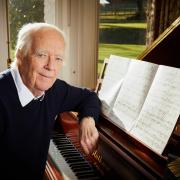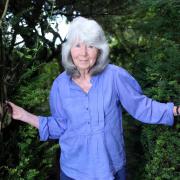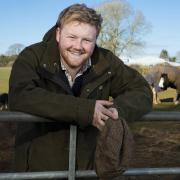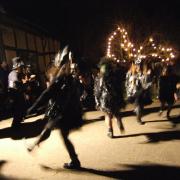The world knew Nell Gifford as a circus owner; an extraordinarily gifted artist whose creativity brought joy to audiences everywhere. Clover Stroud knew her as a sister; a sister whose death in 2019 ripped her world apart
Chipping Norton Literary Festival: April 21-24
We were standing on a beach the summer before she died, having had crab sandwiches with our children, when we had very briefly tried to talk about death, and she had said to me: ‘I cannot talk about it. I cannot talk about the pain of not being there to see my children grow up. I cannot bear the thought of not being with them. I cannot talk about the pain of not seeing you surrounded by your grown-up children. I cannot bear these things.’
WHEREAREYOUWHEREAREYOUWHEREAREYOU W H E R E A R E Y O U W W H E R E A R E Y O U W H E R E AREYOUWHEREAREYOU.
The Red of My Blood, A Death and Life Story, Clover Stroud

Clover Stroud is at home when I call.
‘Whilst we’re talking, I’m going to put my boots on, get my dog, and I’m going to walk around the field. And chat while I’m walking. Is that all right? I’ve just got back from taking my kids to school. How are you doing? Whereabouts do you live, Katie?’ she asks, words a-tumble; warm and open; balancing mobile in one hand, wellies in another; the chaos of life with five children – from 21 to five years old – spilling over the airways.
I know she lives in Oxfordshire, not far from White Horse Hill, which figures in her writing like a father confessor; like a mantra to chant when thinking becomes torture; or maybe – rather, sometimes – like a safe embrace.
Clover was on her way to the hill on a Sunday in December 2019. At 3.47pm. Not just any Sunday. Not any 3.47pm. But moments away from seven days since her sister, Nell, died.
Honouring Nell.
Because how could Clover – exactly one week after her sister’s death – be emptying bins or looking for a lost shoe.
Stop all the clocks…

As her younger children scream in protest at being dragged on a walk, wind whipping, grey sky lowering, she opens her arms and shouts Nell’s name to be borne away on those same brutal currents.
Later, when they’re home, Clover finds a letter pushed through the door. The sender gently writes: in case ‘you wanted to talk at any point’ or there ‘was anything I can do to help’. But into those kind words, Clover reads an impossible demand: perhaps she’s expected to send an email in reply. Or to give some kind of answer to an impossible question: What can I do?
Because there is nothing anyone can do.
Nothing other than a portal in time; a portal to take her back to when her sister was alive.
The book Clover has written about her grief – The Red of My Blood – is perfect; an encapsulation of loss burning with such pain that, at times, it’s too scorching to hold.
Today, too, I worry, as I speak with her.
Maybe it’s too much.
‘I did a podcast yesterday and I started crying. But it’s never too much to talk about Nell. I find it very, very emotional. I’m also really happy to talk about her; for the opportunity to do that.’
And so we do. We talk about the phenomenon that was Nell Gifford. Circus owner. Genius circus owner. Writer, performer, artist. The woman who brought magic to village greens when her painted wagons pulled up, and her artists – strongmen, acrobats, musicians, gymnasts, clever horses, Tweedy the Clown – poured out to give joy to crowds of all ages.
At least, I do.
Clover talks about Nell, her sister.

I INTERVIEWED Nell Gifford, up on the hill in Lypiatt, in September 2019. She’d had chemo a few days earlier and was feeling so sick. ‘Please let’s rearrange,’ I offered. And offered. And offered… watching Nell clutch a table as though the floor were roiling.
But – a millisecond’s pause – she wouldn’t hear of it.
In October 2015, she’d been diagnosed with stage 4 breast cancer. There followed a horrid pattern: treatment; all-clear; anther diagnosis; another all-clear.
In 2019, Nell learned that the cancer had spread to her bones. Even so, the oncologist was cautiously optimistic. Maybe another five years. Perhaps 10.
In December 2019, Nell was admitted to hospital with a suspected blood clot on the lung. They thought she’d be in for a week. On December 7, 2019, blood results showed she had advanced liver failure.
Only on the day before her last did Nell know she was dying, writes Clover.
The consultant knelt down beside her bed to tell her. (Nell never shied from the truth.)
‘A day,’ she said to my father, looking up at him as he stood, beloved, at her bedside when he arrived at the hospital.
‘I have a day to live.’
Nell died on December 8, 2019, at 4.20pm, aged 46.

‘WORDS. SO MANY WORDS to deal with in the days after death,’ Clover begins chapter 1.
Clover Stroud is a wordsmith – a writer and journalist, who grabs beauties and harsh realities of life and binds them with silken-rope descriptions to a page.
Yet when Nell dies, words not only become useless; they become distorted; they become accusations. ‘You think of the many, many things you should have said to her… to be completely sure, utterly sure, that she knew how much you loved her.’
She knows Nell knew. Just as, in reality, she understands the death certificate for Eleanor Rose GIFFORD (Occupation Circus Proprietor), with its caveat: Certificate is not evidence of identity.
But, she thinks – even begins to believe – perhaps the certificate’s warning – ‘not evidence’ - means Nell’s death might not actually be real. Surely, if she looks under duvets; if she calls her name round the house, she’ll find Nell. It simply cannot be true that Clover will never see her again.
The thing about Death is this: it not only strips the fabric of your life; it also – in a way you haven’t given it permission to do – changes you as a person, this loss.
‘It does totally change you, and you really resist it to start with… That’s what I tried to do, in the beginning of the book, to go backwards in time. To reach back to where you were when you were together.’
It wasn’t only grief Clover was feeling. (What does ‘only’ mean?)
It was trauma.
‘Nell died very suddenly and very quickly. Just before she died, we were told she had a few more years so we had all been feeling quite positive and buoyed up.
‘She was 46, the age I am now – which I count as young still; she was so vibrant and so alive. She was working so hard, and she’d had a wonderful holiday in Cuba with her boyfriend, Pozo, and her children and Nancy her best friend; and she was off buying horses.
‘And, you know, SHE WASN’T going to die! That was a kind of a ridiculous idea.
I remember saying,’ You’re not going to die, you’re not going…’ I just couldn’t. It was impossible to contemplate and impossible to allow the thought to come into your head; because, if you allowed it to come into your head, then it might actually happen.’

WHAT I DIDN’T SAY, when I told you I’d interviewed Nell, was why I’d interviewed her. She’d written a children’s book, Nell & the Circus of Dreams; a picture-book about a little girl whose mother is ill; and whose world is transformed when a circus arrives on her doorstep.
It didn’t take complicated psychology to understand something of where this beautiful book came from. In 1991, when Nell was 18 and Clover 16, their mum, Charlotte, had a catastrophic riding accident that left her brain-damaged for the last 22 years of her life.
For the sisters, that trauma never receded (why would it); they explored it through extraordinary creativity: Nell in the circus; Clover in writing.
‘During one of our last conversations, on Marlborough Common, Nell was standing there in her amazing burgundy costume from that last show. And she said, ‘I just really wish I was back in the past with you and mum’.
‘That level of trauma, particularly at that moment in your life as an adolescent, as you’re kind of being forced into an adult, is utterly life-changing. And I know that Nell and I have spent the rest of our lives – and I’m continuing to do it because I go back to it all the time – trying to work out what happened.’
The two of them didn’t just lose their mum – Charlotte was still alive, but unable to interact, or care for herself – they lost their home, their security, maternal love: ‘It totally forged our sense of who we were and it fed into both of our work.’
And that was another aspect of this complicated loss.
That with Nell gone, that shared understanding also disappeared.
‘It was a really complicated loss. You’re totally right to say that. Because we went through the years of mum’s accident together; the feeling that she is no longer there to understand it – to be able to talk to her about it – is sometimes really scary.’
There’s something else about my interview with Nell.
In life, Nell lost her mum and gained a circus.
In her book, Nell’s mother gets well, and the circus disappears.
‘I’d rather have my mum than the circus, you know,’ Nell told me.
I repeat this to Clover.
‘Nell absolutely adored [the circus]. It occupied every fibre of her consciousness. The circus was a vehicle for her art and she used it in an unusual way.
‘As kids, she was obsessed by monkeys and soft toys that were shaped like monkeys; there were monkeys all over our bedroom; she said she was going to be a monkey trainer when she was older.
‘We had these kittens and we would dress them up in clothes and do little shows with them. When I was really young, and we actually still lived in Oxford [before the family moved to Minety], she made me a clown costume and we went out onto the pavement. She turned a bicycle upside down and span the wheel.’
She laughs.
‘She made me dance. We thought it was a really amazing act.’
But Nell’s sentence – I’d rather have my mum – made me realise how we mythologise public figures. We lovers of Giffords Circus think we understood Nell… Maybe we understood the performance without understanding the reasons for the creativity behind it.
There’s a bit in Clover’s book that makes me laugh. It’s when Nell says to her, ‘I often feel I hate the circus. The demands of it… I’d really like to be a health and safety officer. Or work in a small gift shop in a small town and not have to do all this.’

THE RED OF MY BLOOD is relentless, raw. It’s wise, uplifting.
Clover’s love of horses has been one salvation; a love she shared with Nell, and with their mum.
And there’s the day Clover spends talking to a woman who lost her 17-year-old son, her only child. There is, Clover writes generously, a hierarchy of grief.
‘When somebody dies very young,’ she tells me, ‘that is a different kind of grief from when somebody has lived a long and fruitful life.
‘I remember looking at Nigella Lawson, who is living in a really gorgeous way; she’s lost her mother, her sister and her husband to cancer. I’m very interested by other people who’ve lost their sisters and how they’ve survived.
‘I wanted to learn from them: How are you managing to live because I can’t see a future for my life that looks right and looks beautiful? I don’t know how to be a mother and how to be the person that I was before.’

But she is learning. ‘I suppose, when we lose somebody, we also have that sense of joining an invisible army. I’m standing in a field right now, with the sun shining, and I imagine a line of people all walking together. When somebody dies, you join that troop of people walking on through life.’
The pain is on-going; still taps you on the shoulder in the most ordinary moments.
‘I had it yesterday. I was walking through Wantage and I saw something in a charity shop that made me burst into tears in the street. And then I carried on walking and it passed.’
What was it?
‘It was just a coat; just a blue kind of mackintosh coat she had. When I see things that link her to normal everyday things – much more than if I see something to do with circus… When I have memories of her as my sister, that’s the kind of strong place that I find her.’
Times goes forwards, not backwards.
‘And it’s not as if, as you get older, life gets easier; but, as you get older, it becomes more and more clear what’s going on in life. Life is full of absolutely extraordinary, strange and terrible and inspiring and appalling surprises.’
Clover will always miss her sister.
‘But I am understanding that I can walk along beside all of those surprises, and I can make something of my life.’

The Red of My Blood is published in hardback by Transworld, £16.99; A Waterstones special edition is also available: waterstones.com/book/the-red-of-my-blood/clover-stroud/2928377079024
Clover Stroud will be talking about The Red of My Blood at Chipping Norton Literary Festival, Saturday, April 23: chiplitfest.com




























